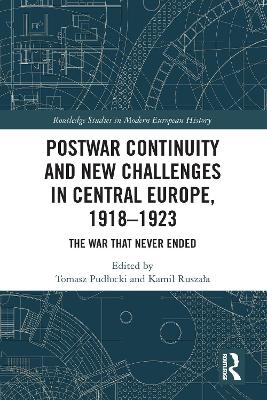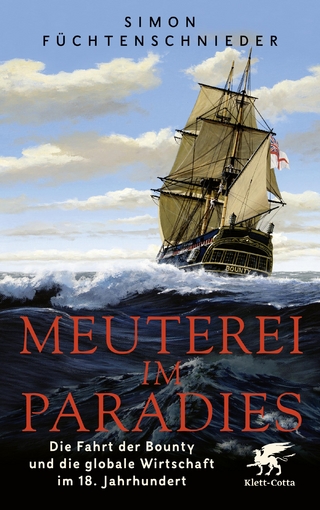
Postwar Continuity and New Challenges in Central Europe, 1918–1923
Routledge (Verlag)
978-1-032-02748-7 (ISBN)
This book presents a multi-layered analysis of the situation in Central Europe after the collapse of the Austro-Hungarian Empire. The new geopolitics emerging from the Versailles order, and at the same time ongoing fights for borders, considerable war damage, social and economic problems and replacement of administrative staff as well as leaders, all contributed to the fact that unlike Western Europe, Central Europe faced challenges and dilemmas on an unprecedented scale. The editors of this book have invited authors from over a dozen academic institutions to answer the question of to what extent the solutions applied in the Habsburg Monarchy were still practiced in the newly created nation states, and to what extent these new political organisms went their own ways. It offers a closer look at Central Europe with its multiple problems typical of that region after 1918 (organizing the post-imperial space, a new political discourse and attempts to create new national memories, the role of national minorities, solving social problems, and verbal and physical violence expressed in public space). Particular chapters concern post-1918 Central Europe on the local, state and international levels, providing a comprehensive view of this sub-region between 1918 and 1923.
Tomasz Pudłocki is Professor in the Institute of History at Jagiellonian University. Kamil Ruszała is Assistant Professor at the Institute of History at Jagiellonian University.
1. The War That Never Ended: East-Central Europe After 1918 Part 1: New Challenges – New Orders 2. The Politics of Recognition at the Paris Peace Conference 3. The Protection of Minorities at the Paris Peace Conference (1919–1920) 4. Montenegro 1918–1921 in the Context of the Adriatic Question 5. Diplomacy and National Identity of Czechoslovakia in the Interwar Period: Appropriation, Thematisation, Institutionalization and Sustainability Part 2: Postimperial Legacies, Legitimism and Memory 6. The Leftover Empire?: Imperial Legacies and Statehood in the Successor States of Austria-Hungary 7. Where Did the Postwar Politics of Memory Lead To? 8. "Hoch den Kaiser!": The Legitimist Cause in Early Postwar Austria Part 3: Long Lasting Violence 9. Polish and Ukrainian Propaganda of Violence During and Shortly After the War for Eastern Galicia (1918–1919) 10. Ethnicization of Anti-Bolshevism: A Comparative Analysis of Anti-Semitic Violence in Hungary and Ukraine (1919–1921) 11. "Robbery and Murder": Conflicts at the Polish-Romanian Border in the Aftermath of the War Part 4: Shaping Postimperial Space: Administration and Society 12. Three Nations at the Crossroads: Poles, Jews and Lemkos Between 1918 and 1919 13. The Formation of a New Administrative and Political Apparatus in Slovakia, 1918–1920: Backgrounds and Networks 14. Feldsberg/Valtice and the Lower Austrian Towns That Became Czech, 1918–1920 15. Defending Christianity and Social Order in the Aftermath of the First World War: Discourse and Polemics in the Austrian Catholic Conservative Press 16. The Denationalized Children of Transylvania: The State Children’s Asylum in Cluj After 1918 Part 5: In the Service of Nation and/or State 17. The Birth of Czechoslovakia Between Ideals and Realpolitik: Masaryk, Beneš and Štefánik in Balance Between Italy and France on the International Chessboard 18. The Ukrainian Greek Catholic Church in 1918–1923: Facing Social and Religious Challenges 19. The Greek Catholic Parish Clergy in Liberation Struggle of the Galician Ukrainians in 1918–1923 20. Serving Science versus Serving the Country: University Professors of Western Neophilologies in Poland, 1918–1923 21. Stefan Surzycki’s Activities for Polish Agriculture in the Revived Polish State
| Erscheinungsdatum | 01.10.2021 |
|---|---|
| Reihe/Serie | Routledge Studies in Modern European History |
| Zusatzinfo | 5 Tables, black and white; 2 Halftones, black and white; 2 Illustrations, black and white |
| Verlagsort | London |
| Sprache | englisch |
| Maße | 152 x 229 mm |
| Gewicht | 739 g |
| Themenwelt | Geschichte ► Allgemeine Geschichte ► Neuzeit (bis 1918) |
| Geisteswissenschaften ► Geschichte ► Regional- / Ländergeschichte | |
| Geschichte ► Teilgebiete der Geschichte ► Kulturgeschichte | |
| ISBN-10 | 1-032-02748-7 / 1032027487 |
| ISBN-13 | 978-1-032-02748-7 / 9781032027487 |
| Zustand | Neuware |
| Haben Sie eine Frage zum Produkt? |
aus dem Bereich


